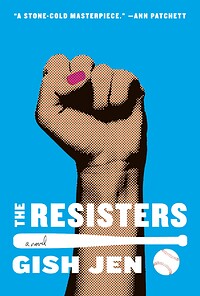Call number
Collection
Publication
Description
An audacious wonder of a novel about baseball and a future America, from the always inventive and exciting author of The Love Wife and Who's Irish. The time: Some thirty-five years hence. The place: AutoAmerica--governed by "Aunt Nettie," an iBurrito of AI algorithms and the internet, in a land half under water. The people: Divided into the angelfair "Netted," whose fate it is to have jobs and live on high ground, and the mostly coppertoned "Surplus," whose jobs have been stripped and whose sole duty now is to consume, living in plastic houses that talk and multi-colored houseboats at the water's edge. Neither group is happy. The story: A Surplus family--he was once a professor, she is still a lawyer--has a girl child, Gwen, who's born with a golden arm. By two she can throw her toy animals straight to the same spot every time. When AutoAmerica and ChinRussia decide to revive the Olympics, suddenly Gwen, who's been playing in the Resisters League her parents have organized, is in great demand. Soon she's at angelfair university, Net U, falling in love with her baseball coach and facing questions of "crossing over," while her mother and her "group" are bringing charges before the botjudge about Surplus rights. An amazing story of a world that looks only too possible, and a family struggling to maintain its humanity in circumstances that daily threaten their every value as well as their very existence.… (more)
User reviews
Grant and Eleanor Cannon-Chastenet, married ex-professor and human rights lawyer, are “Surplus”—their jobs have
Heroic Eleanor has been arrested and tortured for fighting in the sluggish and rigged courts for basic freedoms, all of which have been stripped from the Surplus in an effort to keep them under control and in their own geographic areas (which are flooded or on the water due to climate change). Grant, the narrator of the novel, tinkers in the basement to try to block spy signals, disrupt his smarthouse’s ever-listening ears, and hide from swarms of drones. His skills get the ultimate test when his daughter, Gwen, turns out to be an amazing pitcher and the family forms an Underground Baseball League (freedom of assembly is forbidden to the Surplus).
Readers shouldn’t expect the Resisters in this book to be synonymous with the Resistance. The book is on a different historical timeline altogether. Political and social strata in the AutoAmerican Apartheid have been reshuffled, except that skin color is still a status symbol. There are plenty of well-meaning liberals on the privileged side, which is called the “Netted” because they all have jobs in technology. For them, the Autonet is helpful, not threatening. The Surplus receive a Basic Income and their only job is to consume goods to keep the economy going—what are they complaining about? If they have secret police (“Enforcers”) it’s their own fault for being so hard to control. There is no point on wasting advanced education on the Surplus either. But AutoAmerica wants to get the Olympics going again, and so they need athletes from that inferior gene pool—and will use invasive surveillance technology to detect who they are, and where they are. No one knows just how much Aunt Nettie knows about them, or how she finds out. Sound familiar?
Jen’s vivid imagination and writing finesse makes this novel endlessly entertaining, with an “aha” of disturbing recognition on every page. The loving, rebellious Cannon-Chastenet family will melt your heart. Parents will recognize the dilemma of wanting to protect your child versus the value of leaving her free to choose, even if she chooses against your most cherished values—because freedom to choose your own destiny is itself one of your most cherished values.
I received an advanced readers copy of this book from the publisher and was encouraged to submit an honest review.
This book has a lot to say about systemic racism and economic oppression, and about the choices people make between group loyalty and individual achievement, and about the invasive nature of surveillance technology. It's also a good baseball story.
I found it engaging, and I thought the themes were handled well without getting heavy-handed, but somehow the dystopian setting never quite congealed for me. I think the book might have been trying to do too much at once, and because a lot of time had to be spent on world-building, some of the bigger themes got watered down.
The book seemingly focuses on a girl, Gwen; "with a golden arm" who is born to a surplus couple, Eleanor and Grant. Eleanor and Grant are resisters, Eleanor as a lawyer, fighting Aunt Nettie in court; and Grant more in a background technological level, finding ways to get around Aunt Nettie's surveillance. Baseball has been banned, but it's obviously what Gwen needs, so they form an underground league.
Some people have complained about too much baseball in the book. I didn't mind that, but I did wish there was less pitching and more fielding. I do question the choice of baseball as a resistance sport. In reality, baseball is pretty aligned with conservative values in the US; basketball would have made more sense.
At any rate, the book is creative and fun. I like Jen's writing, but the story is narrated by Grant, and his voice to grate at times.
Part of the problem is the setup. She's loaded everything in to her dystopia: a suffocating state, overwhelming surveillance, class divisions, climate change, and racism. Of course,
The ideas are good, but the book gets bogged down in jargon--lots of shortenings and abbreviations--and world building. The plot and characters don't get free of it, or their predetermined moral roles.
It's too bad
